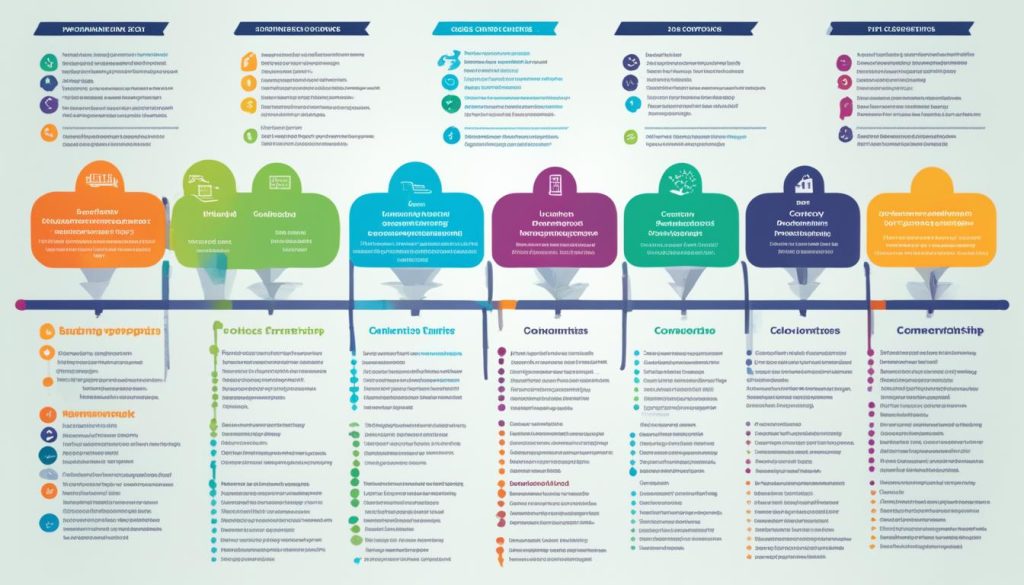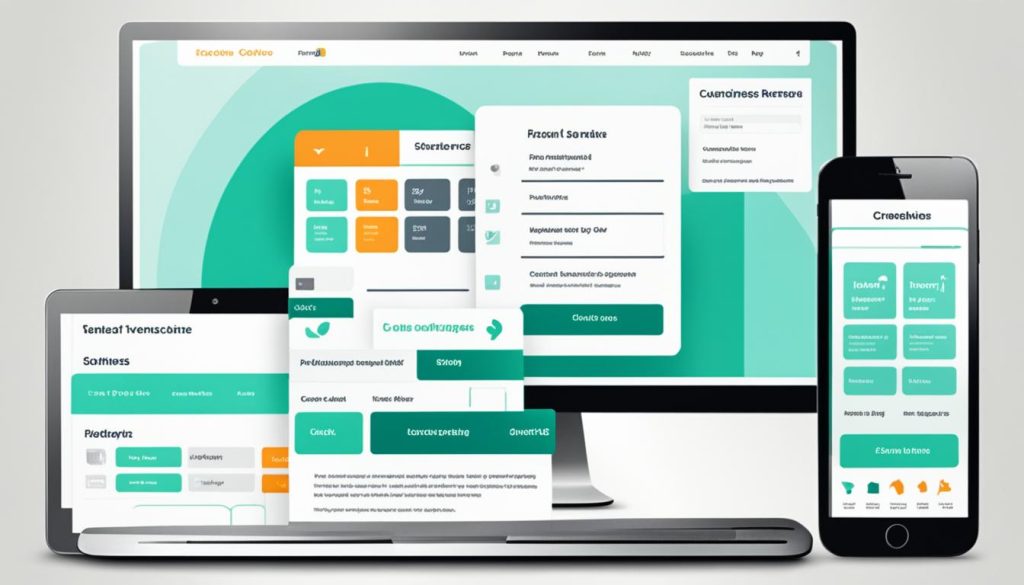Today, more people in the UK want to start their own businesses from home. Starting a business at home is smart and suits your lifestyle. It lets you work while enjoying life.
Setting up a business at home can be tough, but the benefits are worth it. This guide will help you begin your business journey. It has tips for those new to business in the UK.
If you like making things by hand or giving advice, you can create a successful home business. Let’s start this journey. It’s full of chances to succeed.
Understanding the Basics of Home-Based Business
Starting a home-based business opens many opportunities that regular businesses can’t match. As you start your journey, it’s key to create a strong base. This includes developing your business idea, following UK law, and using market research. These steps are crucial for a successful business at home.
Defining Your Business Idea
A strong business idea is the first step to success at home. Think about what you love and how you can offer something valuable to others. Finding a match between your passion and what people need is important. It keeps you driven and creative.
Legal Considerations for Home-Based Entrepreneurs
Understanding legal rules is essential for working within UK laws. You must register your business and know about insurance and licenses. Being careful with these legal aspects saves problems later. It’s not just about following rules; it’s about safeguarding your business.
The Importance of Market Research
Doing detailed market research is key when starting your business. It helps you know your audience, check out the competition, and see future trends. This lets you tweak your business idea to better meet customer needs. Good research early on can make or break your business idea.
Planning Your Home Business
Starting a home business requires careful strategic business planning. You need to build a solid foundation that can support your goals. This foundation must also adapt to changes in the home business world. The home enterprise framework you develop is vital. It acts as a guide towards achieving success.
To succeed in today’s digital world, a solid business plan development strategy is crucial. A good business plan shows potential investors or banks what you aim to do. It outlines your vision, goals, and how you plan to operate. Here are key components to include in your business plan:
- Executive Summary: This section briefly describes your business idea, the market opportunity, and what makes your business unique.
- Business Objectives: Here, you list SMART (Specific, Measurable, Achievable, Relevant, and Time-bound) goals. These goals help guide your business to its ultimate vision.
- Operational Plan: This part gives a detailed look at everyday operations. It covers logistics, technology, staffing, and processes key to your business.
- Financial Projections: These are future financial statements predicting income and profitability. They show the financial future of your business.
Spend time creating a strong plan to ensure a well-structured start. It helps your business deal with challenges and grab opportunities. Remember, a business plan should evolve. Update and refine it as your business grows.
Setting up Your Home Office
Setting up a productive office at home requires more than a desk and chair. The perfect setup helps your work and boosts productivity. We’ll show you how to design a great workspace, pick the right spot, choose necessary tools, and arrange your area for both efficiency and comfort.
Choosing the Right Location
Choosing the right place for your home office is very important. To stay focused and limit distractions, think about these points:
- Find a quiet spot away from busy areas.
- Your office should have natural light, good air, and a door for privacy.
- Being close to the internet router ensures a strong connection, which is key for home offices.
Essential Equipment and Supplies
Having the right equipment is essential for smooth work from home. Make sure your home office has:
- A computer or laptop that meets your work needs.
- Fast internet to connect with clients and team members.
- An ergonomic chair and desk for comfort during long hours.
- Enough storage to keep things tidy and documents in order.
- Basic supplies like pens, paper, and a printer for paper needs.
Creating an Efficient Workspace
Designing a space that promotes efficiency is key for focus and productivity. Use these tips for your office layout:
- Choose good lighting to prevent eye strain. Natural and desk lighting are best.
- Use organisational tools to keep your space neat and your mind clear.
- Keep important items close to make your workflow smooth.
- Add personal touches like plants or art to stay motivated.
A well-thought-out home office setup can blend comfort with productivity perfectly. Following these workspace design tips and ensuring you have all the essentials will lay the groundwork for a successful home business.
Establishing a Business Structure
Starting a home business in the UK is exciting. The first big step is choosing the right legal structure. This choice is key because it affects your taxes, how much debt you might owe, and how you can run your business. When looking at options like sole proprietorship and limited company, think about what these mean for your business dreams and legal needs.
Sole Proprietorship: This is the simplest business form. It means your business is just you and is pretty easy to start. But remember, being a sole trader means you could lose personal stuff if your business owes money.
- You get to make all business decisions
- Less paperwork and easier taxes
- Your business money is treated like your personal money for taxes
Limited Company Formation: Setting up a limited company means your business is its own thing, separate from you. This protects your personal stuff if the business has debts. But, you have to follow stricter rules and let people know more about your business finances. Yet, this could save you money on taxes and make people trust your business more.
- Owners aren’t personally responsible for all business debts
- You might pay less in taxes
- There’s more work in managing the business and you must share certain info with the public
Think about your business’s current needs and your future goals when picking a business type in the UK. Whether you want to run things alone or have a structured business like a limited company, your choice is crucial. It will help your business grow and succeed.
Managing Finances for Your Home Business
For those running a home business, handling finances well is as vital as your offer. This part gives key insights into financial management. It talks about bookkeeping and strategic planning to keep your business financially secure.
Opening a Business Bank Account
Opening a business bank account is crucial for separating your personal and business money. It shows clients you’re professional and helps build your credit history. Look for a bank that has low fees, good services, and is convenient. A bank familiar with business banking strategies can be a big help as your business grows.
Accounting and Bookkeeping Fundamentals
Learning bookkeeping best practices is key for keeping track of your money. Good records make taxes easier and clear up your financial situation. Using good accounting software helps make these tasks easier, lets you be more accurate, and saves time for other business areas.
- Keep your financial records in order.
- Watch your invoices, receipts, and spending closely.
- Check your bank statements regularly to catch any mistakes.
Budgeting and Financial Planning
A good business budgeting strategy is crucial for financial planning. It acts like your business’s money plan. By predicting your income and setting budgets, you avoid spending too much. You can also see ahead to financial challenges and chances.
- Know your fixed and changing costs.
- Guess your income in a realistic way.
- Use your money wisely and check your budget often.
Using these financial rules every day helps you make choices based on data. This leads to a successful, profitable home business.
Marketing Strategies for Home-Based Businesses
The world of home business marketing keeps changing. Today, it’s important for business owners to use various digital marketing ways. These methods help build a strong brand. A strong brand is key to long-lasting relationships with customers. Let’s look at important marketing strategies for your home business.
First, work on your USP to stand out from others. Then, ensure your marketing materials all share this unique point. This creates a strong, unified message about your brand.
- Content Marketing: Create useful content that solves your audience’s problems. This might be engaging videos, blog posts, or infographics. They show you know your stuff.
- Email Campaigns: Build direct relationships with customers through emails. Sending newsletters and special offers keeps them interested and coming back.
- Local Advertising: If you have a shop or offer local services, use online strategies and local ads. Ads in local papers or sponsoring events can increase your visibility nearby.
Using these methods requires careful planning and some experimenting. It’s about finding what your customers like best. The goal is to become known for reliability, quality, and value. This makes your business stand out in a crowded market.
How to Create a Strong Online Presence
In today’s world, having a strong online presence is vital for any thriving home-based business. Entrepreneurs can use the internet to grow their reach, share their brand’s story, and connect with customers. The keys to success include great website design, smart social media use, and understanding SEO basics. These steps can make your business more visible online.
Building a Business Website
Your website acts as the online face of your business. It must reflect your brand and be easy to use. To make your website work well, here’s what you should do:
- Use a simple layout and make sure it’s easy to navigate.
- Make your site mobile-friendly to cater to smartphone users.
- Add clear calls-to-action to encourage visitors to buy or get in touch.
- Keep your site updated to stay engaging.
Leveraging Social Media
Using social media wisely can help your business soar. Pick platforms your audience loves and create appealing content:
- Find where your ideal customers hang out online.
- Plan your posts with a content calendar for regular updates.
- Talk to your followers with comments, messages, and fun content like polls.
- Use platform analytics to improve your social media strategy.
Understanding SEO and Content Marketing
SEO basics increase your business’s visibility online. Combining SEO with great content marketing brings more people to your site, helping you gain new and keep returning customers:
- Use keywords related to your business and industry in your content.
- Create informative content that highlights your expertise.
- Improve your site’s search engine ranking with keyword-rich meta tags and descriptions.
- Add links within your content to engage visitors longer.
By following these tips, you’ll make sure your home-based business not only reaches your target audience but also connects with them. This leads to growth and long-term success online.
Networking and Building Client Relationships
For those working from home, nurturing connections is vital. Online networking lets us build and keep relationships without worrying about distance. Yet, it’s more than just connecting on sites or liking updates. It involves creating a plan for managing client relationships that is both personal and far-reaching. This helps keep customers for the long haul.
Joining Relevant Online Communities
Starting with effective online networking means finding and joining groups that fit your business’s area. These could be forums or social media groups specific to your industry. Being active is important. By sharing what you know, asking questions, and supporting others, you become seen as dependable and informed. This builds a strong basis for client relationships.
Strategies for Effective Networking
- Offer value before expecting anything back. Helping others establishes you as a key contact.
- Keep up consistent interactions. This keeps your business in people’s minds.
- When possible, take online connections offline. Meeting for coffee or going to a conference makes online friendships real.
Maintaining Customer Engagement
- Make experiences personal. Show you know your clients by tailoring your chats to their likes and history.
- Use customer feedback. Let customers know you value their thoughts and are always aiming to get better.
- Keep customers coming back with strategies like loyalty schemes, exclusive material, or first dibs on new offerings.
At its heart, managing client relationships is a steady blend of talk, respect, and flexibility. It recognises the personal side of each sale. By offering interesting content, being ready to help, and caring genuinely, companies don’t just win customers. They earn brand champions.
Time Management and Productivity Tips
Time is very precious for entrepreneurs running a home business. Efficiency directly affects how much profit they make. That’s why it’s crucial to get good at managing time. The tips below offer great ways to handle tasks better. They help boost productivity in your business.
-
Outline Your Daily Objectives: Start every day by making a short list of goals. List your tasks by how urgent they are. This way, you’ll make big progress in completing tasks and getting more done.
-
Allocate Specific Time Blocks: Give different parts of your day to various tasks. Keep to a set schedule to stay disciplined and avoid putting things off.
-
Prioritise Ruthlessly: Understand what each task means and rank them. Always deal with the most critical tasks first. This ensures important work is never missed out.
-
Embrace Tech Solutions: Use digital tools and software to make work easier. Automating tasks saves time for things that need your direct input.
-
Avoid Multitasking: Finish one task before starting another. This keeps you focused and helps avoid mistakes.
-
Limit Distractions: Make a workspace that helps you concentrate. Stay away from home distractions. This is key for managing your time well when working from home.
To wrap it up, running a successful home business depends on managing time well. Follow these tips to make your business grow. Always look for ways to do better. This will help you make steady progress and lead to success.
Complying with Regulations and Obtaining Permits
Starting a home business in the UK means you need to know the rules well. Making sure your business follows the law helps it grow strong. We’ll talk about UK rules for home businesses, getting permits, and understanding taxes.
Navigating Home Business Regulations
Understanding UK rules for home businesses can seem tough. These regulations impact how you run your business and your profits. It’s vital to know about zoning laws, health and safety rules, and data protection laws. Also, find out if there are special rules for your type of business.
The Process of Securing Business Permits
Getting the right permits and licenses is crucial. The permits you need depend on your business type. For example, you might need a Food Business Registration for catering or a trading license for public trading. Do your research or get legal advice to make sure you have what you need.
Understanding Tax Obligations
Every business must deal with taxes, and home businesses are no different. You might need to register for VAT or learn about self-assessment tax returns. HM Revenue and Customs (HMRC) offers help for business owners. This help is great for keeping up with tax duties and avoiding problems.
Being up-to-date and taking action on UK business rules, permits, and taxes is key for home businesses. Taking the time to learn about these areas is as important as developing your products or services. It helps your business be steady, well-regarded, and financially sound.
Growth and Expansion Considerations
As your home-based business grows, adopting new expansion strategies becomes essential. It’s important to keep your brand’s core values while exploring new areas. Hiring more staff and diversifying your income streams ensures your success continues.
Scaling Your Business from Home
Scaling your business from home requires careful planning. Start by reviewing your processes to see which can be automated. Keeping your quality high as orders increase is also vital. Think about if your product or service can grow within your home or if you need more space.
Outsourcing and Hiring
As your business expands, you might need extra help. Outsourcing lets you hire specialist skills without full-time employees. Yet, hiring permanent staff adds value with their dedication to your goals. Think about creating flexible roles that grow with your company.
Exploring Additional Revenue Streams
To strengthen your business financially, consider different income sources. This could involve new products that match your current ones, additional services, or online products. Look into subscription models, affiliate marketing, or partnerships. These can offer new revenue paths without affecting your main focus.
- Review current processes for potential scaling
- Assess the need for physical expansion vs. digital enhancement
- Identify tasks that can be outsourced
- Establish roles for future employees with growth in mind
- Investigate new products or services for income diversification
Conclusion
Starting a home business takes more than passion. You need careful planning and relentless dedication. This guide walked you through each step needed to launch a business from home. It highlighted the importance of preparation and adaptability.
We’ve given you the tools and insight to turn your ideas into reality. Remember, while there will be challenges, the rewards of growing your own business are huge. In the UK, you’re not alone. There’s plenty of support available for entrepreneurs.
This guide aims to leave you inspired and ready to move forward. Your willingness to learn and adapt is key. It will drive your business forward. Now, take what you’ve learned and start building your dream with confidence.




















